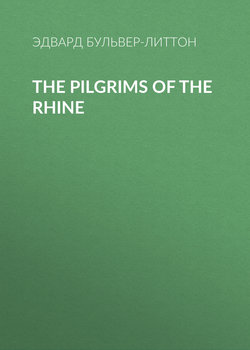The Pilgrims of the Rhine

Реклама. ООО «ЛитРес», ИНН: 7719571260.
Оглавление
Эдвард Бульвер-Литтон. The Pilgrims of the Rhine
ADVERTISEMENT TO THE FIRST EDITION
PREFACE
THE IDEAL WORLD
THE PILGRIMS OF THE RHINE
CHAPTER I. IN WHICH THE READER IS INTRODUCED TO QUEEN NYMPHALIN
CHAPTER II. THE LOVERS
CHAPTER III. FEELINGS
CHAPTER IV. THE MAID OF MALINES
CHAPTER V. ROTTERDAM.—THE CHARACTER OF THE DUTCH.—THEIR RESEMBLANCE TO
CHAPTER VI. GORCUM.—THE TOUR OF THE VIRTUES: A PHILOSOPHER’S TALE
CHAPTER VII. COLOGNE.—THE TRACES OF THE ROMAN YOKE.—THE CHURCH OF ST
CHAPTER VIII. THE SOUL IN PURGATORY; OR LOVE STRONGER THAN DEATH
CHAPTER IX. THE SCENERY OF THE RHINE ANALOGOUS TO THE GERMAN LITERARY
CHAPTER X. THE LEGEND OF ROLAND.—THE ADVENTURES OF NYMPHALIN ON THE
CHAPTER XI. WHEREIN THE READER IS MADE SPECTATOR WITH THE ENGLISH
CHAPTER XII. THE WOOING OF MASTER FOX.9
CHAPTER XIII. THE TOMB OF A FATHER OF MANY CHILDREN
CHAPTER XIV. THE FAIRY’S CAVE, AND THE FAIRY’S WISH
CHAPTER XV. THE BANKS OF THE RHINE.—FROM THE DRACHENFELS TO BROHL.—AN
CHAPTER XVI. GERTRUDE.—THE EXCURSION TO HAMMERSTEIN.—THOUGHTS
CHAPTER XVII. LETTER FROM TREVYLYAN TO –
CHAPTER XVIII. COBLENTZ.—EXCURSION TO THE MOUNTAINS OF TAUNUS; ROMAN
CHAPTER XIX. THE FALLEN STAR; OR THE HISTORY OF A FALSE RELIGION
CHAPTER XX. GLENHAUSEN.—THE POWER OF LOVE IN SANCTIFIED PLACES.—A
CHAPTER XXI. VIEW OF EHRENBREITSTEIN.—A NEW ALARM IN GERTRUDE’S
CHAPTER XXII. THE DOUBLE LIFE.—TREVYLYAN’S FATE.—SORROW THE PARENT OF
CHAPTER XXIII. THE LIFE OF DREAMS
CHAPTER XXIV. THE BROTHERS
CHAPTER XXV. THE IMMORTALITY OF THE SOUL.—A COMMON INCIDENT NOT BEFORE
CHAPTER XXVI. IN WHICH THE READER WILL LEARN HOW THE FAIRIES WERE
CHAPTER XXVII. THURMBERG.—A STORM UPON THE RHINE.—THE RUINS OF
CHAPTER XXVIII. THE VOYAGE TO BINGEN.—THE SIMPLE INCIDENTS IN THIS TALE
CHAPTER XXIX. ELLFELD.—MAYENCE.—HEIDELBERG.—A CONVERSATION BETWEEN
CHAPTER XXX. NO PART OF THE EARTH REALLY SOLITARY.—THE SONG OF THE
CHAPTER XXXI. GERTRUDE AND TREVYLYAN, WHEN THE FORMER IS AWAKENED TO THE
CHAPTER XXXII. A SPOT TO BE BURIED IN
CHAPTER THE LAST. THE CONCLUSION OF THIS TALE
Отрывок из книги
COULD I prescribe to the critic and to the public, I would wish that this work might be tried by the rules rather of poetry than prose, for according to those rules have been both its conception and its execution; and I feel that something of sympathy with the author’s design is requisite to win indulgence for the superstitions he has incorporated with his tale, for the floridity of his style, and the redundance of his descriptions. Perhaps, indeed, it would be impossible, in attempting to paint the scenery and embody some of the Legends of the Rhine, not to give (it may be, too loosely) the reins to the imagination, or to escape the influence of that wild German spirit which I have sought to transfer to a colder tongue.
I have made the experiment of selecting for the main interest of my work the simplest materials, and weaving upon them the ornaments given chiefly to subjects of a more fanciful nature. I know not how far I have succeeded, but various reasons have conspired to make this the work, above all others that I have written, which has given me the most delight (though not unmixed with melancholy) in producing, and in which my mind for the time has been the most completely absorbed. But the ardour of composition is often disproportioned to the merit of the work; and the public sometimes, nor unjustly, avenges itself for that forgetfulness of its existence which makes the chief charm of an author’s solitude,—and the happiest, if not the wisest, inspiration of his dreams.
.....
Lucille’s family were Catholic, and, like most in their station, they possessed the superstitions, as well as the devotion of the faith. Sometimes they amused themselves of an evening by the various legends and imaginary miracles of their calendar; and once, as they were thus conversing with two or three of their neighbours, “The Tomb of the Three Kings of Cologne” became the main topic of their wondering recitals. However strong was the sense of Lucille, she was, as you will readily conceive, naturally influenced by the belief of those with whom she had been brought up from her cradle, and she listened to tale after tale of the miracles wrought at the consecrated tomb, as earnestly and undoubtingly as the rest.
And the Kings of the East were no ordinary saints; to the relics of the Three Magi, who followed the Star of Bethlehem, and were the first potentates of the earth who adored its Saviour, well might the pious Catholic suppose that a peculiar power and a healing sanctity would belong. Each of the circle (St. Amand, who had been more than usually silent, and even gloomy during the day, had retired to his own apartment, for there were some moments when, in the sadness of his thoughts, he sought that solitude which he so impatiently fled from at others)—each of the circle had some story to relate equally veracious and indisputable, of an infirmity cured, or a prayer accorded, or a sin atoned for at the foot of the holy tomb. One story peculiarly affected Lucille; the narrator, a venerable old man with gray locks, solemnly declared himself a witness of its truth.
.....